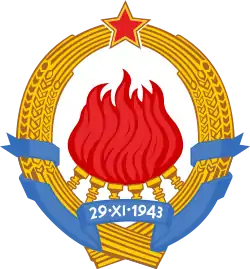Burma–Yugoslavia relations
Burma–Yugoslavia relations were historical foreign relations between Burma (modern day Myanmar) and now split-up Socialist Federal Republic of Yugoslavia. Both countries were among founding members of the Non-Aligned movement and U Kyaw Nyein personally attended the movement's first conference in Belgrade. During its years of rise and active participation in the world politics Yugoslavia represented a role model to Burma with many high-level Burmese officials (including U Kyaw Nyein) stating as their future political goal “to transform Burma into the Yugoslavia in Asia.”[1] Yugoslavia and Burma found common ground in the fields of ideology and foreign policy and the League of Communists of Yugoslavia led by Vladimir Dedijer attended the 1953 Asian Socialist Conference in Rangoon.[1]
.svg.png.webp)

Burma |
Yugoslavia |
|---|---|
The 1947 Constitution of Burma closely followed the model of the 1946 Yugoslav Constitution in an effort to clearly distinguish the foundational legal document from the earlier colonial era common law.[2] In 1953 Yugoslavia supported Burma at the United Nations following its accusation made against the nationalist Republic of China (Taiwan) for aggression.[3]
See also
References
- Jovan Čavoški (April 2010). Arming Nonalignment: Yugoslavia’s Relations with Burma and the Cold war in Asia (1950-1955) (PDF). Woodrow Wilson International Center for Scholars.
- "The Burma constitution". Australian Outlook. Australian Institute of International Affairs. 2 (2). 1948. Retrieved 5 December 2020.
- "Burma Formally Asks U. N. to Act Against 'Aggression' by Formosa; India, Yugoslavia and the Soviet Bloc Join in Plea -- Tsiang Denies Charge -- New U. S. Gun Reported in Guerrillas' Hands". The New York Times. 18 April 1953. Retrieved 5 December 2020.

